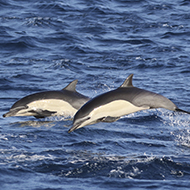
Solitary dolphin recorded making similar sounds to local porpoises
A dolphin that has lived alone in Scotland’s Firth of Clyde for at least 17 years appears to be communicating with porpoises in the area, scientists have discovered.
The short-beaked common dolphin, nicknamed Kylie by local people, is thought to have made his home there after getting separated from his group.
Dolphins of this type do not often visit the Firth of Clyde, so Kylie has mostly been exposed to sounds made by other species, particularly the harbour porpoise.
Since at least 2004, he has frequently been seen in the company of porpoises and research by the University of Strathclyde now implies that he has learnt to produce similar sounds.
Data suggests that the clicking sounds made by common dolphins for echolocation are broadband and have peak frequencies below 100 kilohertz (KHz). Other sounds used for communication include whistles and barks.
Harbour porpoises, however, produce narrow-band, high frequency echolocation clicks, with peak frequencies around 130KHz. These sounds are used for travelling, foraging and communication.
PhD research student Mel Cosentino studied audio recordings of Kylie’s vocalisations, both when he is alone and with porpoises.
The results, which are currently unpublished, show that Kylie regularly produces clicks with peak frequencies over 130KHz when he is with harbour porpoises, far more often than when he is alone. Buzzing sounds were also recorded, but no whistles. No changes in porpoise acoustics were detected.
Ms Cosentino will gather and analyse more recordings of the dolphin when he is alone to verify her findings before submitting them for peer review. However, she said these initial findings suggest Kylie is changing his acoustic repertoire as a result of interactions with the porpoises.
She added: “If further analysis shows this to be the case, it would be the first time a common dolphin, either in captivity or the wild, has demonstrated an ability for production learning, where it has learned to imitate another species.”



 RCVS Knowledge has welcomed Professor Peter Cockcroft as editor-in-chief for Veterinary Evidence.
RCVS Knowledge has welcomed Professor Peter Cockcroft as editor-in-chief for Veterinary Evidence.